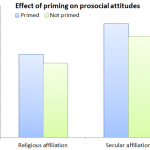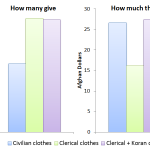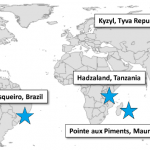In a remote highland region of south-eastern Turkey lies the remains of what is possibly the world’s old temple. Dating to 11,000 years ago, it predates even the rise of agriculture – as far as we can tell, it also predates the first complex societies.
Now, not all religions are the same. Some (a minority, in fact) believe in gods that not only care about what people do, but promise rewards to those who behave well to strangers and punish those who do not. These kinds of gods rejoice in the name Moralising High Gods.
Research on pre-modern cultures around the world has suggested that belief in Moralising High Gods is closely intertwined with social complexity. And also that adherents of ‘world religions’ – ones with universals Moralising High Gods – tend to be more altruistic towards strangers (something that’s thought to be essential for large-scale societies.
But the question that all this research has never been able to get to the bottom of is this. Which came first, moralising gods or moral societies?
The myriad cultures of the Pacific offer a unique test bed for theories like this. Spread out across thousands of islands lie some 400 individual cultures, and the fascinating thing is not only that they are all related, but that their family tree can be reconstructed by analysing the languages they speak.
Joseph Watts, at the University of New Zealand, and colleagues took 96 cultures that have been most heavily studied and coded them according to whether they worshipped moralizing high gods or spirits who could hand out punishment but weren’t particularly interested in being kind and generous (typically, these were ancestor spirits that were quite happy with dastardly actions – so long as they weren’t directed at family). Many societies they analysed didn’t believe in any kind of punishing spirits or gods.
They also coded whether or not the societies were politically complex. Then they used techniques usually used to unravel evolutionary family trees to figure out which of these traits (belief in Moralising High Gods, belief in broad supernatural punishment, and social complexity) came first.
What they found was that complex societies did indeed tend to also believe in Moralising High Gods, but that it was highly unlikely that the god belief came first. In fact, in all six societies in which such beliefs emerged, it seems to have arisen independently and relatively recently.
However, they did find that belief in broad supernatural punishment tended to precede the emergence of social complexity. Neither supernatural punishment nor Moralising High Gods seemed to help societies keep together – societies with these beliefs were just as likely to fall apart as those without.
So what does this all mean?
Well, one possible explanation is that the idea that supernatural punishment of wrongdoers helps to keep people in line, and thereby helps civilization to grow, still holds. It’s just that ghosts and small spirits are enough – you don’t need a Moralizing High God. Maybe amoral ghosts can induce morality.
Watts and his colleagues aren’t buying it. The problem is that you would, at very least, expect the same effect to hold for Moralizing High Gods as for meddling spirits. So they offer an alternative explanation.
An alternative explanation for the coevolution of broad supernatural punishment (BSP) and political complexity is that beliefs in ancestral spirits are a common source of supernatural punishment, which are used to make claims of political authority. An example of a culture in which geneology was used to justify political leadership is Hawaii, where the ancestors of chiefs were elevated to the place of gods and provided chiefs with both authority and supernatural power in the form of mana.
In other words, bigging up your ancestors helps to boost the leader’s authority.And that allowed them to expand their power to dominate ever larger groups and maybe, just maye, triggering the first steps of civilization
Religion in the service of secular power. Now there’s a theme with a long history!
![]() Watts, J., Greenhill, S., Atkinson, Q., Currie, T., Bulbulia, J., & Gray, R. (2015). Broad supernatural punishment but not moralizing high gods precede the evolution of political complexity in Austronesia Proceedings of the Royal Society B: Biological Sciences, 282 (1804), 20142556-20142556 DOI: 10.1098/rspb.2014.2556
Watts, J., Greenhill, S., Atkinson, Q., Currie, T., Bulbulia, J., & Gray, R. (2015). Broad supernatural punishment but not moralizing high gods precede the evolution of political complexity in Austronesia Proceedings of the Royal Society B: Biological Sciences, 282 (1804), 20142556-20142556 DOI: 10.1098/rspb.2014.2556
















